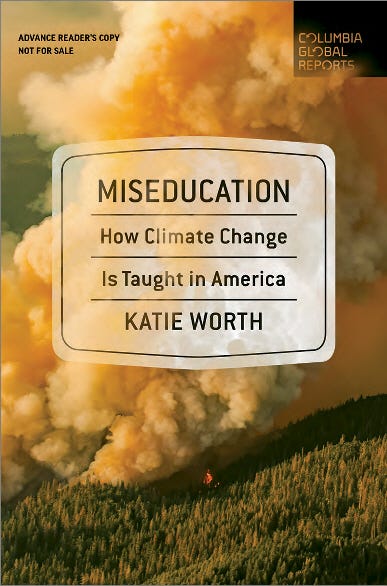Raising Awareness: The Miseducation of Climate Science in Schools
Written on
Chapter 1: The Influence of Big Oil on Education
The campaign to undermine climate science education mirrors tactics used by Big Tobacco. In her book Miseducation, Katie Worth exposes the extensive efforts by Big Oil to create skepticism among students, teachers, and parents regarding climate change. Various educational stakeholders, including teachers, schools, and legislative bodies, have succumbed to a relentless stream of misinformation designed to confuse and mislead. Consequently, belief in climate science has significantly diminished among Americans.

Worth’s approach was methodical; she visited a range of middle schools across states like California and Oklahoma, as well as Hawaii and the Marshall Islands. Engaging with teachers, students, textbook authors, and school board members, she uncovered a convoluted landscape of misinformation. The insights she gathered from industry-funded non-profits and corporate executives revealed a cacophony of contradictory claims that serve only to confuse American students—an outcome that appears to have been the intended goal from the start.
In her investigation of the Marshall Islander community in Oklahoma, Worth found individuals who had relocated due to rising sea levels. They are aware that their homeland faces an uncertain future, a reality acknowledged even by their government. Yet, in Oklahoma, discussions about climate change are often met with resistance or outright denial.
Section 1.1: The Education System's Approach to Climate Science
In the U.S., school textbooks that touch on climate issues are designed to foster debate rather than provide clear education. Unlike well-established scientific theories, such as gravity, climate science is treated as a controversial topic open to personal interpretation. This leads students to believe that they must choose between competing narratives rather than learn factual information. The textbooks, instead of being informative, often mislead students.
Subsection 1.1.1: The Role of Publishers
Publishers often claim they are simply responding to the demands of school systems. If a district prefers to include misleading information about climate change, they will accommodate that request. Worth notes that approximately one-third of teachers convey to their students that many scientists think global warming might be a natural phenomenon—a statement that is misleading. Additionally, two-thirds of teachers promote debates about whether human activity or natural processes are responsible for climate change. This widespread misconception among educators reflects the influence of the oil industry's strategy, which has succeeded in spreading doubt.
Section 1.2: The Consequences of Misinformation
It is troubling that in some regions, climate science cannot be taught accurately—or at all. With climate change impacting various sectors, from agriculture to economics, this lack of proper education leaves students unprepared for future employment in a rapidly changing world. As a result, generations of Americans are growing up without a fundamental understanding of the challenges they will face.
Chapter 2: The Broader Context of Science Education
The situation is exacerbated in areas where evolution remains a contentious topic. Julie Angle from Oklahoma State University highlights the resistance to teaching evolution, demonstrating a broader trend of educational reluctance. Historical incidents, such as the 1925 order to remove evolution from Texas textbooks, illustrate a long-standing battle against scientific education in the U.S. Similarly, climate science may be relegated to a minor role or omitted entirely from curricula.
The generational cycle of misinformation continues, as many parents who have absorbed anti-climate change rhetoric pass these beliefs onto their children. This trend is further complicated by governmental policies, such as the Trump administration's decision to remove climate-related information from the Environmental Protection Agency's website, fostering an environment where climate science is seen as a taboo topic.
Worth points to the American Petroleum Institute, which has long engaged in efforts to instill doubt about climate science, similar to the strategies employed by Big Tobacco. Their tactics include targeting teachers and students to build resistance against policies aimed at addressing climate change.
Moreover, organizations like the Heartland Institute actively distribute materials that promote skepticism about climate science. They financially incentivize the publication of anti-climate change papers, further contributing to the misinformation landscape.
Despite the challenges, educators recognize that students desire a more solution-oriented approach to learning about climate change. The overwhelming negativity surrounding climate issues can be disheartening and frustrating for students, a tactic that aligns with the goals of climate change deniers to create confusion.
While Worth’s book presents a thorough examination of these issues, it is important to approach her claims critically. The federal government does not simply relinquish control over education to the states; rather, it engages in a complex relationship with state education systems.
Miseducation is part of the insightful Global Reports series from Columbia University, which provides concise yet powerful analyses of pressing issues. Each installment builds upon the last, making for a compelling series of works that illuminate the challenges facing society today.